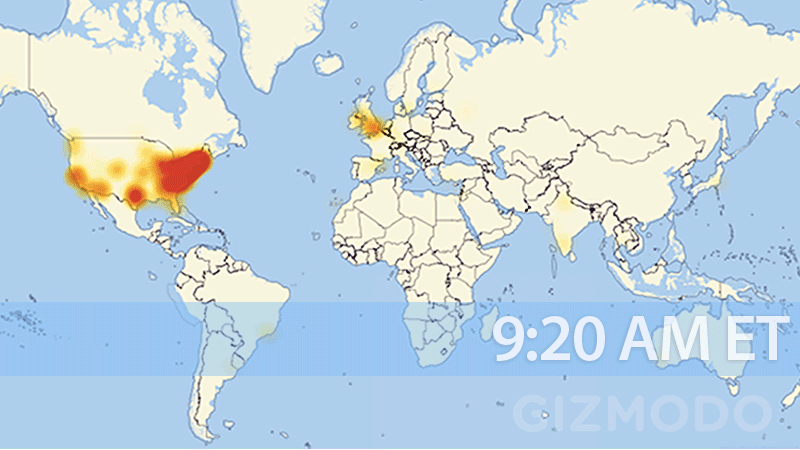 A major internet infrastructure and DNS provider, Dyn, was briefly taken down by a massive DDOS (Distributed Denial of Service) attack:
A major internet infrastructure and DNS provider, Dyn, was briefly taken down by a massive DDOS (Distributed Denial of Service) attack:
Criminals this morning massively attacked Dyn, a company that provides core Internet services for Twitter, SoundCloud, Spotify, Reddit and a host of other sites, causing outages and slowness for many of Dyn’s customers.
In a statement, Dyn said that this morning, October 21, Dyn received a global distributed denial of service (DDoS) attack on its DNS infrastructure on the east coast starting at around 7:10 a.m. ET (11:10 UTC).
“DNS traffic resolved from east coast name server locations are experiencing a service interruption during this time. Updates will be posted as information becomes available,” the company wrote.
DYN encouraged customers with concerns to check the company’s status page for updates and to reach out to its technical support team.
………
The attack on DYN comes just hours after DYN researcher Doug Madory presented a talk on DDoS attacks in Dallas, Texas at a meeting of the North American Network Operators Group (NANOG). Madory’s talk — available here on Youtube.com — delved deeper into research that he and I teamed up on to produce the data behind the story DDoS Mitigation Firm Has History of Hijacks.
That story (as well as one published earlier this week, Spreading the DDoS Disease and Selling the Cure) examined the sometimes blurry lines between certain DDoS mitigation firms and the cybercriminals apparently involved in launching some of the largest DDoS attacks the Internet has ever seen. Indeed, the record 620 Gbps DDoS against KrebsOnSecurity.com came just hours after I published the story on which Madory and I collaborated.
The record-sized attack that hit my site last month was quickly superseded by a DDoS against OVH, a French hosting firm that reported being targeted by a DDoS that was roughly twice the size of the assault on KrebsOnSecurity. As I noted in The Democratization of Censorship — the first story published after bringing my site back up under the protection of Google’s Project Shield — DDoS mitigation firms simply did not count on the size of these attacks increasing so quickly overnight, and are now scrambling to secure far greater capacity to handle much larger attacks concurrently.
I’m not sure if the miscreants intend to mess with the election, or the holiday shopping season, but this could get really ugly really fast.
